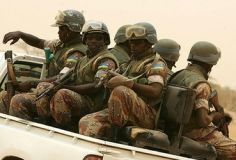Sudan accepts Darfur hybrid force, details being worked out – UN
June 11, 2007 (UNITED NATIONS) — U.N. Secretary-General Ban Ki-moon has received a letter from Sudan’s president unequivocally accepting a joint U.N. and African Union force to help end the bloodshed in Darfur but details must be worked out, a U.N. spokeswoman said Monday.
 A copy of the letter, obtained by The Associated Press, however, did not give Sudan’s unequivocal backing to the proposal.
A copy of the letter, obtained by The Associated Press, however, did not give Sudan’s unequivocal backing to the proposal.
Final approval for the 23,000-strong force faces at least one major obstacle because President Omar al-Bashir told France’s foreign minister earlier Monday that he wants all the peacekeepers to come from Africa. The United Nations and the African Union have pledged to seek African troops first, but say they will use non-African troops if necessary.
The U.N. and AU recently asked Sudan to approve troops from two African countries and two non-African countries to strengthen the beleaguered 7,000-strong AU force already in Darfur. This deployment is part of a heavy support package that will pave the way for the much larger U.N.-AU hybrid force.
Ban told reporters he received a letter from al-Bashir a few days ago responding to a revised plan for the hybrid force to help end the four-year conflict. He said the United Nations, the African Union and Sudan were holding talks right now in Addis Ababa, Ethiopia on the proposal.
“I sincerely hope that we will be able to have early resolution of this issue,” he said.
Afterwards, U.N. spokeswoman Michele Montas said Ban considers the letter from al-Bashir “positive to the extent that it does accept the hybrid force” — including the revised U.N.-AU outline for the force.
Asked whether this was unequivocal, she replied: “Yes, I would say that.” But Montas said the letter did not go into specifics, which were being discussed in Addis Ababa.
In the June 4 letter, al-Bashir told Ban the relevant departments in his government “are currently busy studying” the U.N.-AU proposal.
“The forthcoming consultations of Addis Ababa scheduled for June 11-12, 2007 represent an important opportunity to demonstrate our commitment to agree on the actions that are required to resolve the conflict in Darfur,” the president said.
He said it is important that the U.N., the AU, and the government of Sudan “agree on the details of the hybrid operation” and the way to address other issues including a ceasefire and political talks to bring in all rebel groups.
Asked about the apparent contradiction, Montas said, “It’s written in al-Bashir’s language. I was comparing it to the other types of letters we’ve had. I think this is the most positive letter we’ve had since the begin of the talks.”
French Foreign Minister Bernard Kouchner, who met al-Bashir for an hour in the Sudanese capital Khartoum, told reporters afterwards that Sudan’s president now fully agreed to a “hybrid operation” but wanted them all to come from Africa.
He appealed to al-Bashir to allow deployment of the force to end the humanitarian suffering in Darfur, where fighting has killed more than 200,000 people and displaced 2.5 million.
The conflict began in February 2003 when ethnic African tribes rebelled against what they consider decades of neglect and discrimination by the Arab-dominated government in Khartoum. Sudanese leaders are accused of unleashing the pro-government Arab militia, the janjaweed, that has committed many of the conflict’s atrocities — a charge they deny.
The hybrid force is the final phase of a three-stage U.N. plan to bolster the poorly equipped and under-funded AU force, which has been unable to stop the fighting in Darfur. Al-Bashir agreed to the package in November, but stalled acceptance of the first two phases and has backtracked on allowing U.N. troops in Darfur.
The revised proposal for the hybrid force resolved a dispute over command of the joint operation.
But whether the vague new language can satisfy potential contributors to a U.N.-AU force who want the United Nations to be in command, and the African Union and Sudanese government, which want the AU to play a major role, remains to be seen.
The agreement appeared to be deliberately opaque to try to win approval from the three major players, and the issue of command and control was likely to be raised in Addis Ababa during their talks on Monday and Tuesday.
The U.N. Security Council will be briefed on the outcome of the Addis Ababa talks on Wednesday, a day before council members head to Africa. The trip includes stops in Addis Ababa on Friday and Saturday and Khartoum on Sunday, where additional discussions on the hybrid force are expected.
U.S. Ambassador Zalmay Khalilzad, who is going on the council’s Africa trip, said he had not heard about al-Bashir’s acceptance of the hybrid proposal.
“It’s not my understanding, but if it is true it’s very welcomed,” he said. “We have said that now that we have an AU and UN agreement it is up to Sudan to accept it. And we expect Sudan, and urge Sudan, to accept it as soon as possible, because the alternative to that is that we would have to start discussing new sanctions to increase Sudan’s incentive to cooperate.”
(AP)
